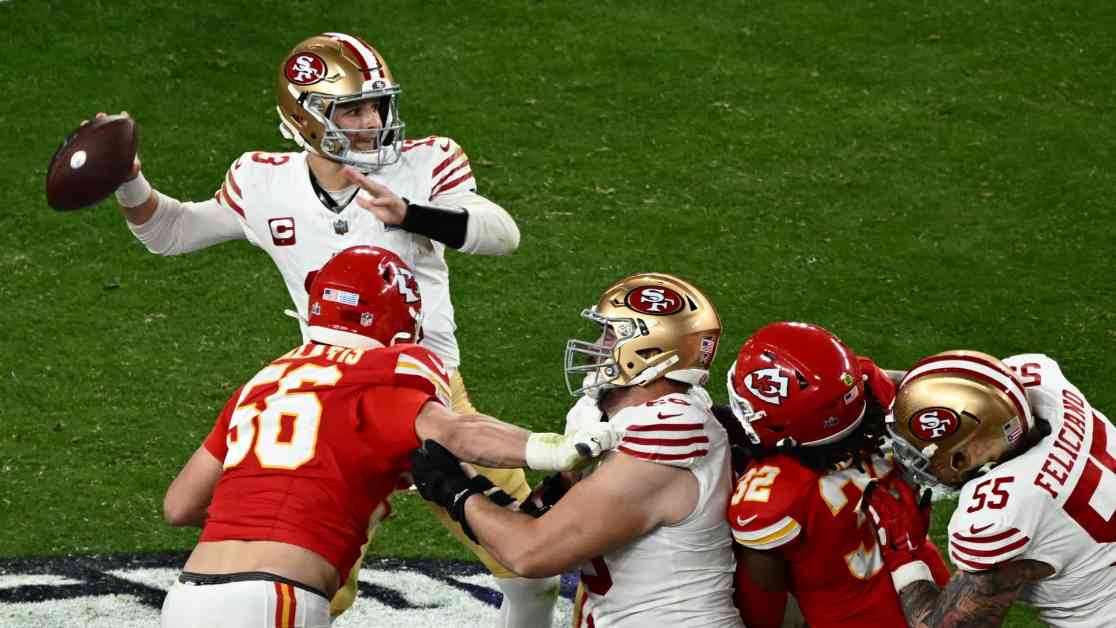San Francisco 49ers quarterback Brock Purdy, the final selection in the 2022 NFL draft, has emerged as a symbol of the challenges in evaluating players in the league. Al Guido, the president of the 49ers, envisions leveraging artificial intelligence to enhance talent assessment not only in football but also in soccer.
Purdy, who led the 49ers to the Super Bowl the previous year, fell to the 262nd overall pick due to scouting metrics overlooking key traits that have contributed to his success as a quarterback. Guido shared his ambitions for integrating AI into talent evaluation processes for both football and soccer during an interview with CNBC Sport on Radio Row in New Orleans ahead of Super Bowl 59. Notably, the 49ers’ ownership group has ties to Leeds, the English football club, further underscoring the importance of this initiative.
Scouting in soccer presents unique challenges, according to Guido, as it is a global sport with diverse leagues representing varying levels of competition. The landscape of soccer allows players from any background to potentially earn a spot on an English Premier League team, highlighting the need for advanced statistical analysis and AI integration in the scouting process to identify top talent across different metrics.
Guido emphasized the importance of combining traditional scouting methods with data-driven insights to enhance player evaluation in both soccer and the NFL. This fusion of “the science” with established scouting practices has become a fundamental aspect of the 49ers’ approach to assessing potential talent.
As discussions around Purdy’s contract extension loom this off-season, Guido refrained from providing a specific timeline for negotiations. However, he expressed confidence that the details would be resolved in due course, stating, “I’m sure it’ll get itself worked out.”
Enhancing Player Evaluation Through AI Integration
The integration of artificial intelligence into player evaluation processes marks a significant shift in the landscape of professional sports. By leveraging AI technologies, teams like the San Francisco 49ers aim to gain a competitive edge in talent assessment, enabling them to identify overlooked attributes and potential in players like Brock Purdy, who defied conventional scouting metrics to become a pivotal player in the team’s success.
Guido’s vision for utilizing AI extends beyond the realm of football to encompass soccer, a sport with its own set of complexities and challenges in player scouting. The global nature of soccer, with its multitude of leagues and diverse talent pools, necessitates a comprehensive approach to talent identification that goes beyond traditional scouting methods. By harnessing the power of AI, teams can analyze vast amounts of data to uncover hidden gems and cultivate a more nuanced understanding of what defines a top-tier player in the modern sports landscape.
Striking a Balance Between Tradition and Innovation
The 49ers’ commitment to marrying traditional scouting practices with cutting-edge technologies reflects a broader trend in the sports industry, where teams are increasingly turning to data-driven insights to inform decision-making processes. Guido’s emphasis on combining “the science” with established scouting methods underscores the importance of striking a balance between tradition and innovation in player evaluation.
As the 49ers navigate the complexities of contract negotiations with Purdy, the integration of AI into their talent assessment processes could play a crucial role in shaping the team’s future roster. By embracing new technologies and methodologies, the 49ers are positioning themselves at the forefront of a rapidly evolving sports landscape, where AI is poised to revolutionize the way teams identify, develop, and retain top talent.
In conclusion, the intersection of AI and player evaluation represents a transformative shift in the sports industry, with the San Francisco 49ers at the forefront of this innovative approach. As teams continue to explore the potential of AI in scouting and talent assessment, the boundaries of traditional methods are being expanded to unlock new possibilities and insights that could reshape the future of professional sports as we know it.



















